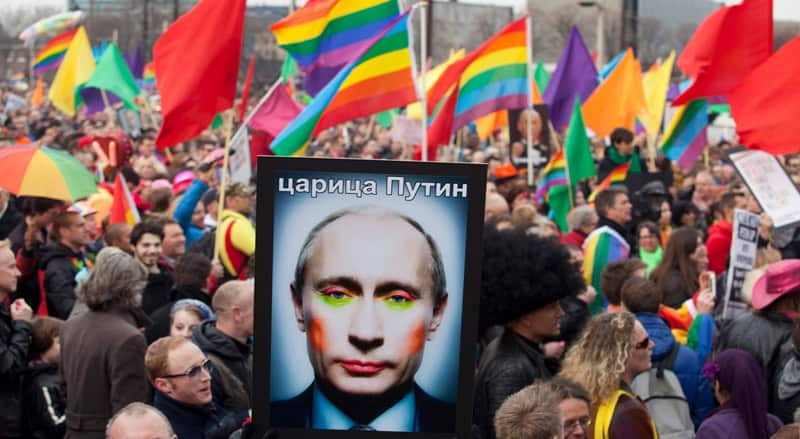Russia’s Supreme Court has banned what it described as “LGBTQ+ activism” while declaring the “movement” to be “extremism.”
The nation’s highest court issued the ruling on Thursday.
The move marks the most drastic step against advocates of gay, lesbian, and transgender ideology in the increasingly conservative country.
The Supreme Court was ruling in response to a lawsuit filed by the Justice Ministry.
The court labeled what the suit called the “LGBTQ+ movement” operating in Russia as an “extremist organization” and outlawed it.
The ruling is the latest step in a decade-long crackdown on the ideology in Russia under President Vladimir Putin.
During his 24 years in power, Putin has repeatedly emphasized that “traditional family values” are core to Russia’s future.
Thursday’s closed-door hearing lasted four hours.
No one besides Justice Ministry representatives were allowed in.
There was no defendant in the case.
Journalists were only taken into the courtroom for the reading of the verdict by Judge Oleg Nefedov.
The judge wore a face mask, apparently for health reasons.
The case was classified, and the ministry didn’t disclose any evidence.
The ministry only revealed that authorities had identified “signs and manifestations of an extremist nature” in the movement it seeks to ban.
The signs of extremism included “incitement of social and religious discord.”
Multiple activists have noted the lawsuit was lodged against a movement that is not an official entity.
Under its broad and vague definition, Russian authorities could crack down on any individuals or groups deemed to be part of the movement.
Before the ruling, the Associated Press spoke with Max Olenichev, a human rights lawyer who works with the Russian LGBTQ+ community.
“In practice, it could happen that the Russian authorities, with this court ruling in hand, will enforce (the ruling) against LGBTQ+ initiatives that work in Russia, considering them a part of this civic movement,” said Olenichev.
The lawsuit targets activists and effectively prohibits any organized activity to promote LGBTQ+ ideology in Russia, Olenichev added.
Multiple Russian independent media outlets and rights groups added rainbow symbols to their logos on social media in response to the ruling.
Amnesty International called the ruling “shameful and absurd.”
The organization warned it could lead to a blanket ban on LGBTQ+ organizations, violate freedom of association, expression, and peaceful assembly, and lead to discrimination.
“It will affect countless people, and its repercussions are poised to be nothing short of catastrophic,” said Marie Struthers, the group’s director for Eastern Europe and Central Asia.
A Russian Orthodox Church spokesman praised the ruling, meanwhile.
The spokesman told the state-run RIA Novosti news agency that it was “a form of moral self-defense by society” from efforts to push “the Christian idea of marriage and family from the public and legal realms.”
Before the ruling, leading Russian human rights groups filed a document with the court that called the lawsuit “anti-lawful.”
They claim the move is discriminatory and a violation of the constitution and international human rights treaties that Moscow has signed.
Some LGBTQ+ activists said they tried to become a party to the lawsuit but were rebuffed by the court.
“We tried to find some legal logic in this absurdity,” said Igor Kochetkov, a human rights advocate and founder of the Russian LGBT Network.
“We tried to appeal to the Supreme Court’s common sense and say: ‘Look, here I am, a person who’s been involved in LGBT activism for years, who’s been promoting these ideas — ideas of defending human rights, mind you — and this lawsuit concerns me,'” he told the AP.
“They don’t want any trial,” Kochetkov added.
“They do not want to address this matter.
“This is a political order, and they are following it.
“It is the end of any kind of justice in Russia, by and large.”
In 2013, the Kremlin adopted the first legislation restricting LGBTQ+ rights.
The bill was known as the “gay propaganda” law.
It banned any public endorsement of “nontraditional sexual relations” among minors.
In 2020, constitutional reforms pushed through by Putin to extend his rule by two more terms also included a provision to outlaw same-sex marriage.
The Kremlin has recently ramped up a campaign against what it called the West’s “degrading” influence.
Last year, Russian authorities adopted a law banning propaganda of “nontraditional sexual relations” among adults, also, effectively outlawing any public endorsement of LGBTQ+ people.
Another law passed this year prohibited “gender-transitioning” procedures and “gender-affirming care” for people who claim to be transgender.
The legislation prohibited any “medical interventions aimed at changing the sex of a person.”
The rule also bans people from trying to change their gender in official documents and public records.
It also amended Russia’s Family Code by listing gender change as a reason to annul a marriage.
People “who had changed gender” were also added to a list of people who can’t become foster or adoptive parents.
“Do we really want to have here, in our country, in Russia, ‘Parent No. 1, No. 2, No. 3’ instead of ‘mom’ and ‘dad?’” Putin said in September 2022, mocking the “woke” gender ideology adopted by the West.
“Do we really want perversions that lead to degradation and extinction to be imposed in our schools from the primary grades?”
READ MORE: Elon Musk Drops Hammer on ‘Woke’ Advertisers: ‘Go F*ck Yourself’

Our comment section is restricted to members of the Slay News community only.
To join, create a free account HERE.
If you are already a member, log in HERE.